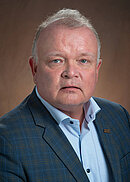NDSU has been awarded a National Science Foundation grant to become a university site of the Center for Bioplastics and Biocomposites, known as CB2. The center is part of NSF’s Industry–University Cooperative Research Centers program and NDSU will receive an initial award of $150,000 to set up the site followed by an expected additional $150,000 in 2020.
NDSU joins current CB2 sites at Iowa State University, Washington State University and the University of Georgia.
NDSU was selected based upon the institution’s long history of sustainable materials research and the strength of industry partnerships. In addition, the CB2 Industry Advisory Board has named NDSU as the lead site given that CB2 founder and director and NDSU engineering professor David Grewell recently moved from Iowa State University to NDSU. Grewell currently serves as chair of the NDSU Department of Industrial and Manufacturing Engineering.
Dean Webster, NDSU professor and chair of coatings and polymeric materials, will serve as the Fargo site director.
“The work these centers are doing is taking the traditional biodegradable products development to the next step,” said Grewell. “Our researchers are creating methods of building long term sustainable products that are co-products of agricultural processes, woody materials as well as other bio-based feedstocks.”
Examples of some of the sustainable products already developed include air conditioning unit components and seed pots previously made of traditional plastics.
Each site has an area of specialty. Grewell said Iowa State University is working on thermoplastics and polymers processing, Washington State University on composites and the University of Georgia on ocean-friendly packing.
“NDSU will continue our history of work on thermosetting polymer systems and their use in applications such as coatings and composites,” Webster said. “Our history and expertise in these areas provides center members with additional scientific expertise in this rapidly growing area of sustainable materials. Our partnerships with industries including the North Dakota Corn Council, Sherwin-Williams, NatureWorks and potentially many other companies are an important component to our work and provide our researchers with an avenue to deliver solutions for the products they create.”
Grewell said the components of the research are bio-based, but the product development generated will not impact the food supply. “We use co-products of the food and agricultural industries,” he said. “We will utilize aspects of crops either considered waste or that which is in large supply in our area, such as soybean oil. Our work will also help remove our dependency on products created by traditional fossil fuels sources.”
The CB2 sites have received financial support through a series of annual industry membership investments from companies including Ford Motor Car Inc., and Sherwin-Williams. Grewell estimates that these memberships will grow to more than $700,000 this year.
“Ford has been an active member of CB2 since its inception,” said Debbie Mielewski, senior tech leader for Ford Motor Company, Research. “We consider it one of our strongest resources to learn about new bio-based materials, suppliers and applications. Having the expertise of NDSU involved just makes it that much more valuable. When it comes to the planet, it is critical that we all work together, and CB2 has been the go-to place.”
The site will function as an educational unit for North Dakota by incorporating programs for undergraduate and graduate students, veterans and other instructors. Research Experiences for Undergrads programs that provide early research opportunities for students also are part of the plan and have already been successfully conducted in other CB2 sites.
“Becoming part of this initiative fits perfectly within our land-grant mission,” said Jane Schuh, NDSU vice president of research. “For over a century, NDSU has delivered important agriculture and technology contributions to the people of our state. Utilizing the raw materials and brainpower of our region, the CB2 site is positioned well to continue driving new innovations for North Dakota and beyond.”
“The impact to NDSU and the region becoming a member of this program will help the university by driving additional research dollars as well as student and industry engagement,” said Webster. “We also see it as an economic driver for the state similar to the ethanol industry. We have the materials to create the products right here. As it is most cost-effective to not move the raw materials that far for processing, we will be providing a solid reason for industry to set up operations in our area.”
Grewell notes that it will be important for state support to make CB2 successful. The team recently hosted North Dakota Lt. Gov. Brent Sanford to show him the value of the center.
“This is another great North Dakota example of technological innovation creating synergy between agriculture and industry,” Sanford said. “Bioplastics is an exciting arena where ag waste products can be utilized as feedstock in applications traditionally filled by petroleum-based materials. It was exciting for me to present the welcome at the CB2 gathering at NDSU and find leaders of industry in attendance who were eager to apply the bioplastics innovation in their material procurement and manufacturing processes. Congratulations to Dr. Grewell and Dr. Webster for bringing this organization and its leadership structure to NDSU and our state.”
As the center is driven by industry in partnership with academics, Grewell said it will be important for the state to help small businesses secure memberships in the center. “CB2 is good for NDSU and North Dakota in many ways,” he said. “We’ll leverage unused biomaterial sources in creating environmentally-friendly and cost-effective new materials. In 12 months, CB2 has doubled in size. That shows that both the need and the opportunity is there.”
As a student-focused, land-grant, research university, we serve our citizens.

